- Home
- Norman Mailer
The Fight Page 5
The Fight Read online
Page 5
Against the perils of Africa and mass hysteria, the antidote was already evident; silence and concentration. If Africa was not Ali’s only weapon, psychology must be his next. Would he try to punish Foreman’s vanity? No physical activity is so vain as boxing. A man gets into the ring to attract admiration. In no sport, therefore, can you be more humiliated. Ali would use every effort to make Foreman feel clumsy. If, at his most fearsome, Foreman looked and fought like a lion, he had, at his worst, a resemblance to an ox. So the first object of training was to work on Foreman’s sense of grace. George was being taught to dance. While he was still happy in the fox-trot, and Ali was eras beyond the frug, monkey, or jerk, no matter, Foreman was now able to glide in the ring, and that was what he would need. Training began with a loosening-up procedure other fighters did not employ. Foreman stood in the center of the ring and meditated as a weird and extraordinary music began to play through the public address system. It was pop. As ambitious, however, as pop music could ever become; sounds reminiscent of Wagner, Sibelius, Moussorgsky and many an electronic composer were in the mix. Nature was awakening in the morning — so went one’s first assumption of the theme — but what a piece of nature! Macbeth’s witches encountered Wagner’s gods on a spastic dawn. Demons abounded. Caves boiled vapors. Trees split with the scream of a broken bone. The ground wrenched. Boulders fell onto musical instruments. Into these sounds, lyrical as movie-music dew, the sun slowly rose, leaves shook themselves, and the sorrowful throbs of an aching soul full of vamping organ dumps and thumps fulfilled some hollow in the din.
Foreman was wearing red trunks, a white T-shirt, reddish headgear, and bright red gloves, a bloody contrast to the sobriety of his mood. As the music played, he began to make small moves with his elbows and fists, miniscule locked-up uppercuts that did not travel an inch, small flicks of his neck, blinks of his eye. Slowly he began to shift his feet, but in awkward steps. He looked like a giant beginning to move after a five-year sleep. Making no attempt to appear impressive, he went through a somnambulistic dance. Near to motionless, he yet evoked the muffled roars of that steamy nature waking up, waking up. All by himself in the ring with a bewildered press and a wholly silent audience of several hundred Africans, he moved as though transition to the full speed of boxing would have to use up its convoluted time. Some Heavyweights were known for how long it took them to get ready — Marciano used to shadowbox five rounds in the dressing room before a title bout — but Foreman’s warm-up suggested that he could become connected again to reflexes in himself only by separating himself altogether from time.
Yet as the music became less of a tone poem to Hieronymous Bosch and more like hints of Oklahoma! coming through Moussorgsky — what sweets and sours! — Foreman’s feet began to slide, his arms to parry imaginary blows. Moving forward, he shadowboxed, cutting off the ring, throwing punches harder at the unstoppable air, working into the woe of every heavy puncher when he misses target (for no punch disturbs the shoulder more than the one that does not connect — professionals can be separated from amateurs by the speed with which their torso absorbs that instant’s loss of balance). Now, Foreman having passed at last through these stages, Sadler cut off the music, and Foreman came to the corner. Wholly remote, he stood there while Sadler carefully greased his face and forehead for the sparring to come. But he was already returned to the full melancholy of isolation and concentration.
He sparred a round with Henry Clark, not trying to hit hard but enjoying himself. His hands were fast and he held them well out in front, picking off punches with quick leonine cuffs of his mitts, then countering quickly with lefts and rights. He had much to learn about moving his head, but his feet were nimble. Clark, a cherubic-looking Black Heavyweight with a reputation of his own (eighth-ranking Heavyweight Contender), was being handled with authority by Foreman. A favorite of the press (for he was friendly and articulate), Clark had been declaring Foreman’s praises for weeks. “George does not hit like other fighters,” he would say. “Even a punch on the arms leaves you feeling paralyzed, and that’s with heavy gloves. Ali is a friend of mine, and I’m afraid he’s going to get hurt. George is the most punishing human being I’ve ever been in with.”
This afternoon, however, with the fight five days away, Foreman was not working to punish Clark (who was due to fight the semifinal with Roy Williams) but, instead, was working at wrestling. Henry would try to hold him, as Ali might, and Foreman would throw him off, or shove him back, then maneuver him to the ropes, where he would hit him lightly, back off, and practice the same solution again from the center of the ring. For whatever reason — perhaps because Clark, a big man, was not elusive enough to test Foreman’s resources at cutting off the ring — Sadler stopped the sparring after a round and put in Terry Lee, a slim white Light-Heavyweight who had the rugged face of a construction worker but happened to be fast as a rabbit. For three rounds, Lee did an imitation of Ali, backing in a circle to the ropes, then quickly skipping in the other direction to escape George, who held the center of the ring. Terry Lee was not big enough to take Foreman’s punches, and Foreman did not try to punish him, merely tapping Lee when he was caught, but Terry gave an exhibition nonetheless, bouncing off the ropes to feint in one direction, bouncing back to feint in the other, and then would scoot through any escape route available, circling away from one set of ropes only to be driven almost immediately to the next, where he would duck, slide, put his hands to his head, fall back against the ropes, spring out, feint, drop his hands, dart, and try to move away again, Foreman stalking him all the while with enjoyment, for his reflexes were growing faster and faster.
Meanwhile, Foreman was learning new tricks every step of the way. Once, Terry Lee, springing off the ropes, skipped under Foreman’s arms like a small boy escaping his father, and the African audience at the rear of the hall roared with derision. Foreman looked unperturbed, even interested, as if he had just picked up a trick by being fooled, and in the next round when Lee tried it again, Foreman was there to block escape. Watching Terry’s talented imitation of Ali, yet seeing how cleverly and often Foreman was eating up room on the ropes and herding him toward a corner, it seemed certain that if Ali wished to win, he would have to take more punishment than ever before in his career.
Having finished three rounds with Lee, Foreman came out of the ring to work on the speed bag. Then he jumped rope. He did this with nice movement of his feet, skipping in enjoyment to the voice of Aretha Franklin, who was singing “You Got a Friend in Jesus.” This workout, from inception to rope-jumping, had been going on for forty-five minutes, the length with one-minute rests of a ten-round fight, and Foreman did not look the least bit tired. He was thriving on the jump rope, the soles of his feet tapping the floor with the éclat of a drummer using his sticks. Foreman was more than graceful now — he was lively with the sweetness of his footwork.
Dick Sadler, his manager, flat cap back on his big round black head, called a halt. “Ladies and gentlemen,” he announced to the crowd, “that ends our episode for today. We’ll be back tomorrow doing the same thing in the same way.” He looked confirmed in a good mood.
Foreman was close to genial in a press conference that followed. Dressed in his embroidered bib overalls, he sat on a long table with the press around him and quietly refused to use a microphone. Since his voice was low it was a direct difficulty for the fifty reporters and cameramen gathered, but he was exercising territorial rights. His mood was his property, and he did not want a shriek from the feedback to go tearing through his senses. Instead, the mike once refused, and the reporters crowded together, he responded to questions with an easy intelligence, his soft Texas voice not without resonance. His replies gave a tasty skew to the mood, as if there were more he could always say but would not in order to preserve the qualities of composure and serenity — they were tasty too.
As Foreman spoke, one of his fifty interviewers — it must be our recent convert to African studies — was thinking of Conversations with Ogotemm�
�li by Mercel Griaule, a fine book. Ogotemmêli looked on the gift of speech as analogous to weaving since the tongue and teeth were a warp and woof on which the breath could serve as thread. Given reflection, the idea was not so unsound. What, after all, was conversation if not a psychic material to be stitched by the mind to other psychic cloth? If most conversations ended in rags, so did most textiles.
Foreman spoke with a real sense of the delicacy of what he might be weaving, a fine tissue, strong in its economy, a true cloth to come out of an intelligent and uneducated man who happened to be Champion.
Samples:
Reporter: “Your eye looks all right to me, George.”
Foreman: “Looks all right to me, too.”
Reporter: “What do you think of your weight?”
Foreman: “Once you’re a Heavyweight, your weight speaks for itself.”
Reporter: “Do you think you’ll knock him out?”
Foreman (in utter relaxation): “I would like to.”
On the ripple of humor this created, Foreman offered a smile. When the next questioner wondered what he thought of fighting at 3 A.M., Foreman gave a longer reply. “Once you’re in good condition,” he said, “you’re able to do a lot of things you’re not able to ordinarily. Good condition makes you more flexible. I really have no concern about the hour.”
“Ali claims he’s met more tough fighters than you have.”
“That,” said Foreman, “may be a factor for me. I got a dog who fights all the time. He comes home whipped.”
“Do you expect Ali to go for the eye?”
Foreman shrugged. “It’s good for anybody to go for anything they can as long as they can. The crow will go for the scarecrow but run away from dynamic people.”
“We hear you’re writing a book.”
“Oh,” Foreman said in his mildest voice, “I just like to keep an account of what’s going on.”
“Do you have a subject for the book?”
“It’ll be about me in general.”
“Plan to publish it?”
He was thoughtful, as if contemplating the uncharted lands of literature that lay ahead. “I don’t know,” he said, “it may be just for my kids.”
Reporter: “Do Ali’s remarks bother you?”
Foreman: “No. He makes me think of a parrot who keeps saying, ‘You’re stupid, you’re stupid.’ Not to offend Muhammad Ali, but he’s like that parrot. What he says, he’s said before.”
They asked him if he liked the country of Zaïre and he looked uneasy and said, first hint of uneasiness to his voice, “I would like to stay as long as possible and visit.” If boxers were good liars, maybe he was no boxer.
“Why are you staying at the Inter-Continental instead of here?” Foreman replied even faster, “Well, I’m accustomed to hotel life. Although I like this place in Nsele.” He was rescued by another query. “We hear President Mobutu gave you a pet lion.”
Foreman brought back his smile. “He’s big enough not to be a pet. He’s a serious lion.”
“Do you enjoy being Champ?” It was as if reporters had the license to ask any stupid question, any whatever. The trouble was that every reason existed for stupid questions. That was when the subject might reveal himself most. “You enjoy being Champ?”
“I think about it every night,” said George, and added with a rush of compressed love for himself that he could not quite throttle into that soft voice, “I think about it and I thank God, and I thank George Foreman for having true endurance.” The inevitable schizophrenia of great athletes was in his voice. Like artists, it is hard for them not to see the finished professional as a separate creature from the child that created him. The child (now grown up) still accompanies the great athlete and is wholly in love with him, an immature love, be it said.
But Sadler, Moore and Saddler had been teaching him to recover from mistakes. So his voice was quiet again and he added quickly, “I don’t think I’m superior to any previous Champion. It’s something I’ve borrowed, and I’ll have to give it up.” He turned expansive. “I even love to see young cats looking at me and saying, ‘Aaah, I can take him,’ and I laugh. I used to be that way. It’s all right. That’s how it ought to be.” He looked so happy with this press conference that he had become a natural force in the room, and everyone liked him. He was a contrast to Ali who, when reporters were about, was always intent over the latest injury to his status and therefore rattled on the being of the media like a tin roof banging in the wind.
The questions continued. Foreman’s answers came back with the velvet touch of a well-worn pair of dungarees. Only once did he give a clue to what he might be like in a temper. A reporter asked what he thought of Ali’s claim that he was more militant in working for his people than Foreman.
George got stiff. The warp and woof were jamming the thread. His breath was a hint constricted. “There is no suggestion,” he said, “that can bother someone who is intelligent. In answer to Ali being more militant …” But his voice rose. “I don’t even think about things like that,” he answered, cutting off the question. It was obvious that anger was upset in him as easily as tears from a spoiled child. There must be a massive instability to his faculties of rage, explanation in part for his rituals of concentration. Like the man who fears falling from high places, and fixes his eyes on the floor so that he need never look out a window, Foreman fixed his mind on the absence of disturbance.
“It’s hard,” said Foreman, “to concentrate and be polite when you’re asked questions you’ve heard before.” He subscribed to the principle that repetition kills the soul. “You see, I’m preparing for a fight. That’s my interest. I don’t want distraction. I have no quarrel with the press, but I like to keep my mind working on the things I set for it. You see,” he said, “you have to be one hundred percent stable in everything you do.” And he looked about him as if to indicate he had been talking long enough.
“George, one last question. What’s your fight prediction?”
Foreman was home. It was over. “Oh,” he said, in no faint parody, “I’m the greatest fighter who ever lived. I’m a wonder. The fifth wonder of the world. I’m even faster than Muhammad Ali. And I’m going to knock him out in three … two … one.” He let his eyes laugh. “I’ll be doing one hundred percent my best,” he said. “That’s my only prediction.”
Now, Dick Sadler was asked a few questions. Short, stocky, about sixty, with a bald head, a flattened nose and a flat black beret sitting on his bald head, Foreman’s manager was rough yet roly-poly, and formidable in his features for they were a map with renovations — Sadler knew how flesh got bent in the real world. Since he was also an amalgam of all that sly wisdom of manner that comes through the cross-fertilization of the various Black establishments: prison, boxing, music, even personal oratory, Sadler, if he had been an actor, could have played anything from a trusty on a chain gang to an aging emcee. He could have done a hoofer or a stand-up comedian, and had; could play piano or trumpet, and had. He was versatile and knew it by the age of nine, when he acted in “Our Gang” comedies. Even now his features made you think of such classic faces as Louis Armstrong or Moms Mabley; Sadler’s mouth was always looking to digest the taste on his lips of the last remark. It was often original for he never needed to say the same thing twice. All the same he made a point of saying the same thing if talking to the press: “Repetition is security for idiots,” said his sardonic look, and he developed his speeches. “George,” he now told them, “is going to keep his left foot between Muhammad’s legs. Oooh!” said Sadler in pain. “That’s where George should be. Hit you in the kidney, hit you in the heart, hit you in the kidney again. Oooh! George does more things than Muhammad. Punches better, better all around, he’s fast and more complete. George can slip, George can parry, George is going to catch you inside, spin you, hit you on the side of your head. You’ll know and maybe you won’t know.” Sadler stopped, looked down, let himself wobble like a drunken man. “Your legs will know it.”
Something of this was clear in the way he had Foreman work next day. There was no boxing, and no fancy sparring, just the eerie sounds of Foreman’s nature music (“I Love the Lord” — Donny Hathaway) and after fifteen or twenty minutes of loosening, brooding and shadowboxing, Foreman went to work on the heavy bag. Sadler stood holding it, a rudimentary exercise usually given to beginners who first must learn to punch into a stationary object. But Foreman and Sadler were practicing something else.
It is punishing for a boxer to have a long workout on a heavy bag. It hurts one’s arms, it hurts one’s head, it can spring one’s knuckles if the hands are not wrapped. Big as a tackling dummy, the bag weighs eighty pounds or more, and when a punch is not thrown properly, the boxer’s body shudders with the shock. It is like being brought down by an unexpected tackle. One bad punch is enough. Now Foreman began to hit this bag with lefts and rights. He did not throw them slowly, he did not throw them fast, he threw them steadily, putting all of his body into each punch, which came to mean that he was contracting and expelling his force forty to fifty times a minute for he threw that many punches, not fast, not slow, but concussive in their power. Sadler leaned forward, braced to the back of the bag, like a man riding a barrel in a storm at sea. He was shaken with every punch. His body quivered from the impact. That hardly mattered, that was part of the show. When the impact of Foreman’s fist on the other side of the bag was particularly heavy, he grunted, and said “Alors” in admiration.

 Ancient Evenings
Ancient Evenings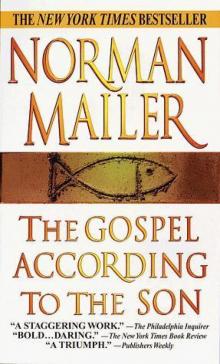 The Gospel According to the Son
The Gospel According to the Son Oswald's Tale: An American Mystery
Oswald's Tale: An American Mystery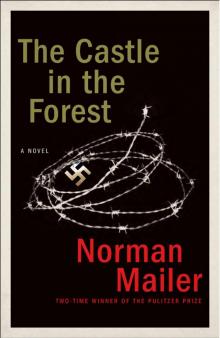 The Castle in the Forest
The Castle in the Forest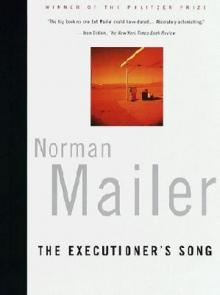 The Executioner's Song
The Executioner's Song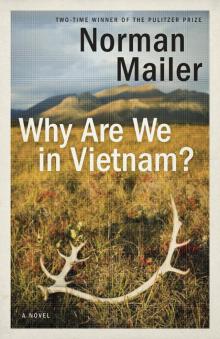 Why Are We in Vietnam?
Why Are We in Vietnam?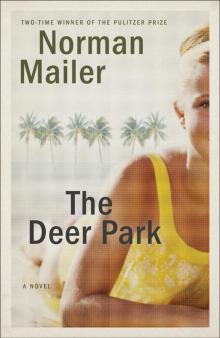 The Deer Park: A Play
The Deer Park: A Play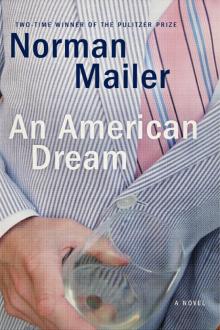 An American Dream
An American Dream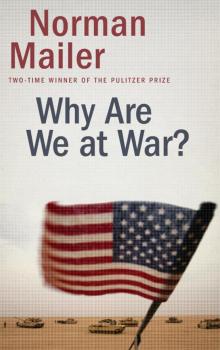 Why Are We at War?
Why Are We at War?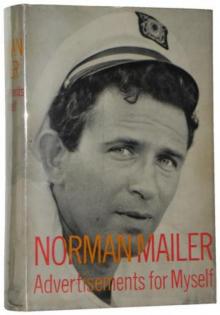 The Time of Her Time
The Time of Her Time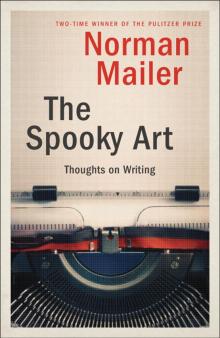 The Spooky Art: Thoughts on Writing
The Spooky Art: Thoughts on Writing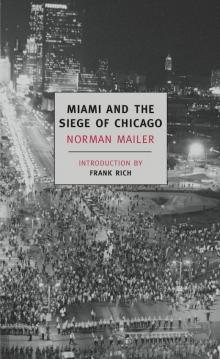 Miami and the Siege of Chicago
Miami and the Siege of Chicago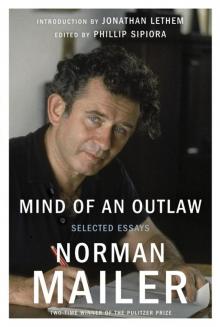 Mind of an Outlaw: Selected Essays
Mind of an Outlaw: Selected Essays Barbary Shore
Barbary Shore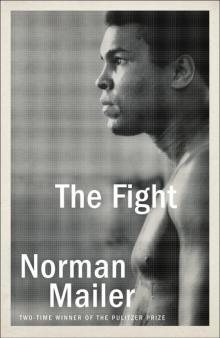 The Fight
The Fight Harlot's Ghost
Harlot's Ghost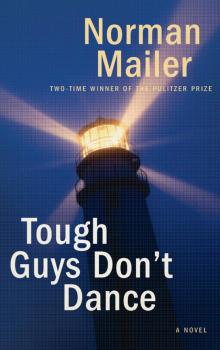 Tough Guys Don't Dance
Tough Guys Don't Dance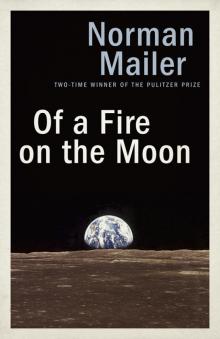 Of a Fire on the Moon
Of a Fire on the Moon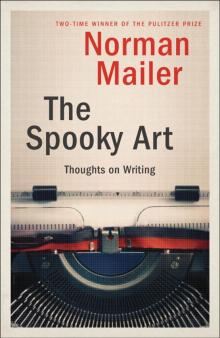 The Spooky Art
The Spooky Art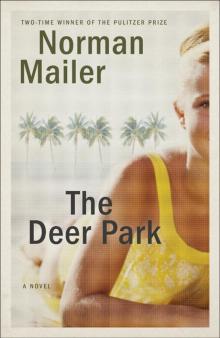 The Deer Park
The Deer Park On God: An Uncommon Conversation
On God: An Uncommon Conversation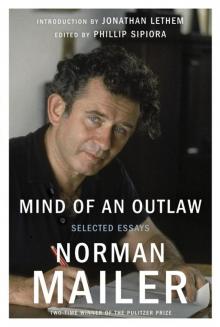 Mind of an Outlaw
Mind of an Outlaw Oswald's Tale
Oswald's Tale